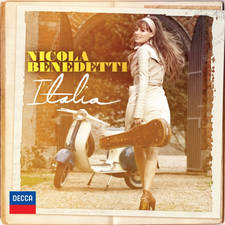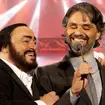Andrea Bocelli On Massenet's Werther
Track eight on the first disc of Andrea Bocelli’s two-disc release of Massenet’s Werther: may I suggest you listen to it? Those who dismiss him as the “microphone tenor” are in for a surprise; those who worship the ground he walks on (and there are millions who do) will simply say, “We told you so”.
The uniformly sweet-toned voice is here as usual, but there’s something else – something darker, richer and more mature. True, there’s still a thinness of sound at certain points in his register, those fleeting moments his critics seize upon whenever the words “Bocelli”, “popular” and “50 million album sales” are mentioned, but they are rare. In any case, they are a part of the tenor’s magic, a brief moment when the mask slips to reveal the very human struggle behind.
As he says, when we meet at his spacious home on Italy’s Adriatic coast,
“There are many singers I’d like to sing with, but they must have a naturally beautiful voice and a wish to serve the music; it’s useless to be voice athletes.”
It’s a devastating remark, especially if you happen to be one of the world’s many technically perfect, but otherwise thoroughly unrecognisable, classically trained singers, but after so much pointed criticism of his vocal style by the music establishment, one has a sneaking sympathy for it.
Massenet’s Werther, an opera based on Goethe’s tale of youthful infatuation and eventual suicide, is the perfect vehicle for Bocelli’s musical, as distinct from athletic, style, and for his new, richer expressive palette. This new recording follows last year’s release of Verdi’s Il Trovatore, in which he played Manrico. That was a very Italian disc – so how, I wondered, was the experience of recording Werther, Bocelli’s first CD of French opera?
“Singing in French is different from speaking it,” he says. “Singers have to follow special courses to learn how to sing French. For example, you sing the words’ final vowels, whereas you don’t articulate them when you are speaking. And the atmospheres the French composers create are wonderful; very different from Italian opera.”
He has starred in two productions of Werther, the first in Detroit in 1999, singing opposite Denyce Graves, and the second in Bologna in 2004. It is this version that Bocelli subsequently recorded for the new disc.
With these experiences under his belt, I was interested to know how Bocelli interprets the character of Werther.
“He is a young boy: happy at the beginning,” he explains. “He’s enthusiastic about life. So at the beginning of the opera it must be a very free type of singing. As the opera goes on, the singing becomes more dramatic. Then, towards the end, it becomes lighter, because in the last act Werther is fatally wounded and all his last strength is used to sing about love. He sings with the voice of a dying man.”
It sounds like a dark role for a star tenor basking in critical and commercial success. How, I asked, could he identify with such a lovelorn character?
“When I started singing I was young and, like all young people, I possessed that kind of melancholy they have as they seek their own identity. I heard in my voice a melancholy, a quality I tried to emphasise in my singing.”
It’s a sentiment that has served him well, as is only too apparent from the discreetly expensive and tasteful surroundings of his newly built five-storey seaside home. Among the pictures, richly upholstered sofas and wall hangings, the most interesting item is a huge glass-fronted cabinet displaying Bocelli’s collection of musical instruments, including a trombone, an accordion, a tuba, a saxophone, a harmonica and a clarinet. He can play them all.
Alongside the cabinet is a collection of records, the most prominent being recordings by his hero and former teacher, Franco Corelli.
“He has been my idol forever, along with Caruso, Gigli and Pavarotti,” says Bocelli. “The most important thing is that they move people, each in their own way. Music is the frame that encompasses our lives.”
When we last met, Bocelli talked of having coaching to strengthen his technique.
“The intention, the musicality, the quality was always there in my voice,” he told us. “What was lacking was the intensity.”
He explained, then, that a singer must build his or her voice and career step by step, and now he does so again:
“I have had to be patient with my voice. I love experimenting and have always been interested in voices, not just my own. I’m always trying to find new things in my voice, and I do this by studying with new teachers and hearing other singers.
"The expression of my voice has become more varied. Before, my voice was a monochrome, albeit with sweetness. Now, with the development of my vocal muscles, I am discovering a new palette of sound colours.”
While Bocelli seems wary of the camera (during the cover shoot he disappears for almost an hour to field a call from his management, and on his return insists on playing the trumpet as, I suspect, a welcome distraction), he seems to enjoy being interviewed. Unlike some artists, who can appear defensive, he leans into the interview, listening hard and weighing his replies carefully. He speaks quietly and softly, his Italian rising and falling musically.
It’s a strange experience as you find yourself being drawn into his world – a world, in the absence of physical gestures (he’s blind, remember, so you find yourself gesturing less and colouring your voice more), of infinitely subtle expression and inflection. It’s not hard to see why, on stage, he’s able to bring such a range of emotion to a single phrase.
Those lucky enough to have beaten the rush for tickets will be able to experience his magic when Bocelli performs at Hampton Court in June. He’s a regular visitor and remembers with special fondness sharing the stage with Kiri Te Kanawa.
Are British audiences different in any way, I ask him,
“No – like all audiences, they give you back what you give them,” he says. “If you give your best, they will answer to that. If you don’t, they stay colder. But I can be wary of the audience. It’s as if they’re examining you...”
It’s a wariness he shares with many performers but it must be especially acute given his blindness, his inability to pick out a friendly face. Perhaps this explains his irritability in front of the camera, where there is little opportunity to connect with anyone.
It might also explain his next sentence:
"I still suffer stage fright. I accept it will always be part of performing, unless I resort to alcohol or psychological treatment, which I’d never do. I’d rather quit!”
However, the cause of Bocelli’s nerve-wracking condition is much more interesting than mere wariness of his audience.
“It’s a feeling of responsibility. People come to the opera with huge expectations. If these are fulfilled, they leave with powerful emotions that stay with them forever. I remember a performance of La Bohème with Corelli at the Puccini Festival, which has been with me ever since. With that knowledge, that insight, you cannot go to the stage lightly.”
I’m surprised by the responsibility Bocelli clearly feels for his music and his audience but, as track eight on the first disc of his new release proves, the tenor is full of surprises.


























